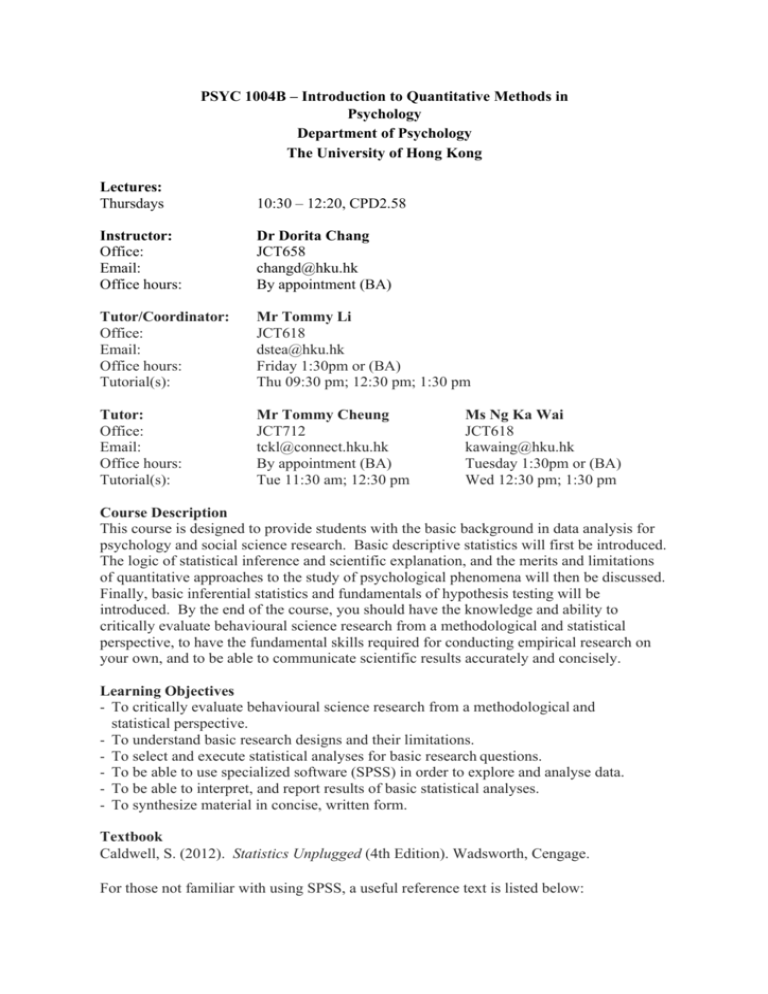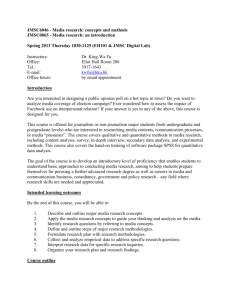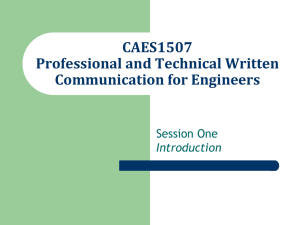Psychology 201, Division 01
advertisement

PSYC 1004B – Introduction to Quantitative Methods in Psychology Department of Psychology The University of Hong Kong Lectures: Thursdays 10:30 – 12:20, CPD2.58 Instructor: Office: Email: Office hours: Dr Dorita Chang JCT658 changd@hku.hk By appointment (BA) Tutor/Coordinator: Office: Email: Office hours: Tutorial(s): Mr Tommy Li JCT618 dstea@hku.hk Friday 1:30pm or (BA) Thu 09:30 pm; 12:30 pm; 1:30 pm Tutor: Office: Email: Office hours: Tutorial(s): Mr Tommy Cheung JCT712 tckl@connect.hku.hk By appointment (BA) Tue 11:30 am; 12:30 pm Ms Ng Ka Wai JCT618 kawaing@hku.hk Tuesday 1:30pm or (BA) Wed 12:30 pm; 1:30 pm Course Description This course is designed to provide students with the basic background in data analysis for psychology and social science research. Basic descriptive statistics will first be introduced. The logic of statistical inference and scientific explanation, and the merits and limitations of quantitative approaches to the study of psychological phenomena will then be discussed. Finally, basic inferential statistics and fundamentals of hypothesis testing will be introduced. By the end of the course, you should have the knowledge and ability to critically evaluate behavioural science research from a methodological and statistical perspective, to have the fundamental skills required for conducting empirical research on your own, and to be able to communicate scientific results accurately and concisely. Learning Objectives - To critically evaluate behavioural science research from a methodological and statistical perspective. - To understand basic research designs and their limitations. - To select and execute statistical analyses for basic research questions. - To be able to use specialized software (SPSS) in order to explore and analyse data. - To be able to interpret, and report results of basic statistical analyses. - To synthesize material in concise, written form. Textbook Caldwell, S. (2012). Statistics Unplugged (4th Edition). Wadsworth, Cengage. For those not familiar with using SPSS, a useful reference text is listed below: Kirkpatrick, L.A., Feeney, B. C. (2015). A Simple Guide to IBM SPSS for Version 22.0. Cengage Learning. Computer Resources Lecture slides will be made available on Moodle. We will use SPSS for statistical analyses. Assessment Participation/Tutorials Participation SPSS Exercises (x2) 6% 14% Homework Homework Assignments Final Integrated Assignment/Report 20% 10% Mid-term quiz Final quiz 15% 35% Quizzes There will be one mid-term quiz (Mar 24) and one comprehensive final quiz (Apr 28). The quiz materials MUST be returned. Leaving the testing room with quiz materials will be viewed as academic dishonesty. No make-up quizzes will be permitted. In the case of a student missing a quiz due to medical reason (with a valid medical proof), his/her performance in the missed quiz will be predicted based on his/her performance in the other components of the course at the end of the semester. Academic Dishonesty Academic dishonesty will not be tolerated. Any student who engages in any form of academic dishonesty (e.g., cheating on exams, plagiarism, interfering with grading) will receive a grade of F in this course and will be reported to the Office of Student Conduct & Ethical Development for further disciplinary action. There will be no exceptions. If you are not sure what constitutes the academic offense of plagiarism, consult your Lecturer or Tutor. You may also consult the relevant HKU webpage on plagiarism at http://www.rss.hku.hk/plagiarism. Plagiarism A hardcopy and a softcopy are required for all written assignments. The softcopy will be checked for plagiarism against a database of articles, books, webpages, and essays submitted by students at HKU and other universities. No credit will be given for an assignment that contains plagiarized materials. Further penalties will also be applied. These penalties include a zero mark for participation in course tutorials and a zero mark for the course. Plagiarism will also be reported to your Faculty for consideration of possible disciplinary action. Assignment Submissions No late assignments will be accepted, unless a valid medical proof (medical certificate) is presented. Assignments are due at the start of the lecture on the day of the deadline. Each assignment submission should be accompanied by a title page with the course code, instructor’s name, your name, UID, and tutorial session written clearly. WK 1 DATE Jan 21 CONTENTS Introduction READINGS TUTORIAL/EXERCISE ASSIGNMENT DUE 2 Jan 28 Basic descriptive statistics (measures of central tendency and variability) Chapter 2 3 Feb 4 Chapters 3, 4 1. Intro to SPSS; Describing and Visualizing Data 4 Feb 11 Distributions (visualizing freqs, percentile ranks) Z-scores and the normal distribution No class (Lunar new year) 5 Feb 18 Correlation and the simple linear regression Chapter 12 2. Score standardization and the normal distribution 6 Feb 25 Sampling and the central limit theorem The confidence interval Chapters 5, 6 3. Correlation and Regression 7 Mar 3 Chapter 9 4. SPSS Exercise 1 Assignment 2 8 Mar 10 Inferential statistics basic concepts (the null and alternative hypotheses; Type I and II errors) No class (Reading Week) 9 Mar 17 10 Mar 24 11 Mar 31 Hypothesis testing: t test, two related and two independent samples Chapter 8 5. Hypothesis Testing I Assignment 3 12 Apr 7 Chapter 10 6. Hypothesis Testing II 13 Apr 14 Hypothesis testing: single-variable, multi-level designs. The basic ANOVA and multiple comparisons. Power (revisit Power and Effect, Chapter 9) 7. Hypothesis Testing III 14 15 Apr 21 Apr 28 Review Final Quiz (10:30 – 12:20; Venue: CPD 2.58 & CPD LG.07) 16 May 5 Final Assignment Due Assignment 1 Inferential statistics: concepts reviewed Chapter 7 Hypothesis testing: t test, single sample Review Mid-term Quiz (10:30 – 12:20; Venue: CPD 2.58 & CPD 2.16) Assignment 4 8. SPSS Exercise 2 Note: The schedule, readings, and assignments are subject to change. Any changes will be announced in class. Final Assignment





